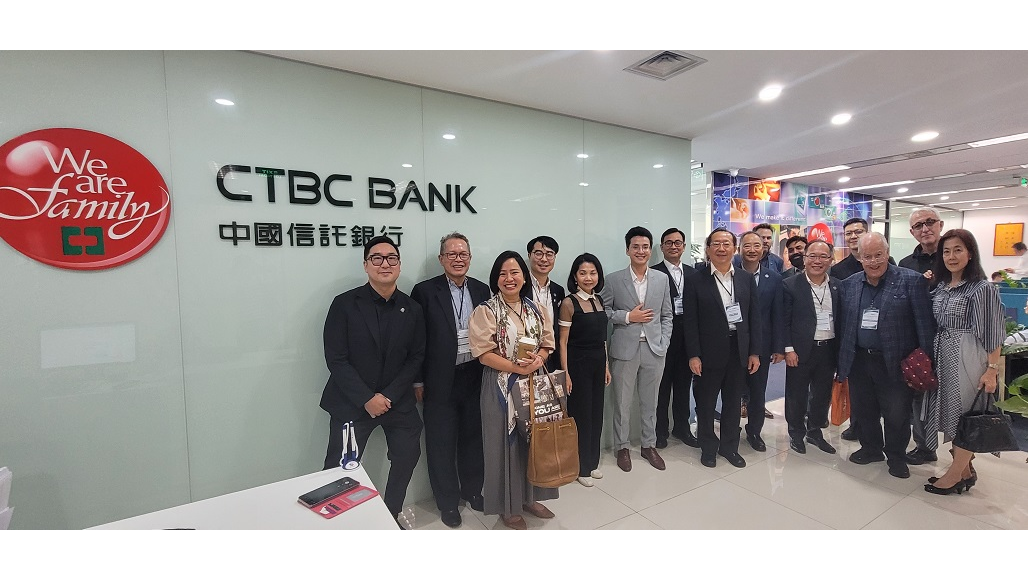Outstanding CACCI Presidential Visit to Vietnam led by Peter McMullin AM - Full Report
A 23-strong CACCI delegation led by President Mr. Peter McMullin AM received a warm welcome from both the private and governments sectors of the Socialist Republic of Vietnam during the CACCI Presidential visit to Hanoi on May 22-23, 2023.
The two-day visit, which followed the CACCI Presidential visit to Taipei held on May 17-18, provided the CACCI delegation the opportunity to strengthen ties between CACCI and Vietnamese government officials and businessmen and to seek their support for the Confederation and its activities.
During their various meetings with Vietnamese private and government sector representatives, Mr. McMullin and members of his delegation from eight CACCI member countries introduced CACCI, elaborating on the Confederation’s objectives and what it does to encourage cooperation among businessmen in the region. They also shared information and exchanged views with the local host organizations on the current business conditions in Vietnam; areas of opportunities for business, trade and investment in the country; and policies set in place by the Vietnamese government to attract foreign investments. The delegation also had the opportunity to network with officers of local institutions and business enterprises and listened to presentations on their activities and projects, especially those that welcome the participation of foreign investors.
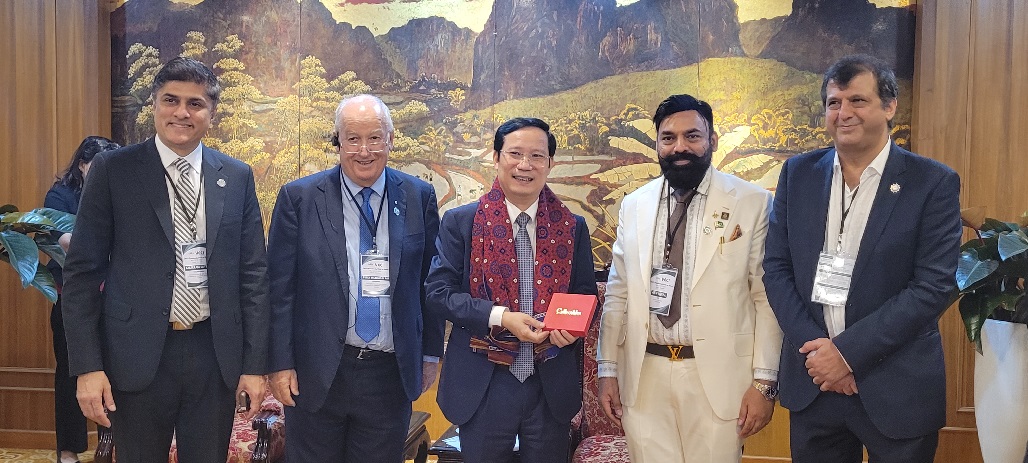
Hosted and organized by the Vietnam Chamber of Commerce and Industry (VCCI), the May 22-23 Vietnam visit was the third Presidential visits conducted by CACCI to Vietnam; the first was in 2011 led by then Ambassador Benedicto Yujuico from the Philippines, and the second one in 2018 headed by Mr. Jemal Inaishvili from Georgia.
The delegation to Vietnam was composed mostly of chamber executives and businessmen from eight CACCI member countries looking at possible business and investment opportunities in Vietnam or considering expansion of their existing businesses in the country, as well as to explore the possibility of attracting Vietnamese businesses to consider the market of their respective countries. A complete list of delegation members is attached at the end of the report.
Following is a chronology of the delegation’s program in Vietnam:
MAY 21, 2023
Dinner hosted by Pakistan’s Ambassador to Vietnam
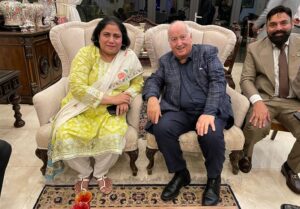 On the eve of Day One of the Vietnam visit program, the CACCI delegation attended the dinner hosted by Pakistan’s Ambassador to Vietnam H. E. Samina Mehtab held at her residence. The dinner was made possible and facilitated by CACCI Vice President Mr. Khurram Sayeed from Pakistan.
On the eve of Day One of the Vietnam visit program, the CACCI delegation attended the dinner hosted by Pakistan’s Ambassador to Vietnam H. E. Samina Mehtab held at her residence. The dinner was made possible and facilitated by CACCI Vice President Mr. Khurram Sayeed from Pakistan.
During the dinner, Ambassador Mehtab informed the CACCI guests about some of the projects and programs that the Embassy has been undertaking to help promote trade and investment activities between Pakistan and Vietnam, especially in products and sectors in which Pakistan has a strong potential for growth and further development.
The delegates from other CACCI member counties also conveyed to the Ambassador the industries that they believe can be explored for possible cooperation between Pakistan and their respective countries.
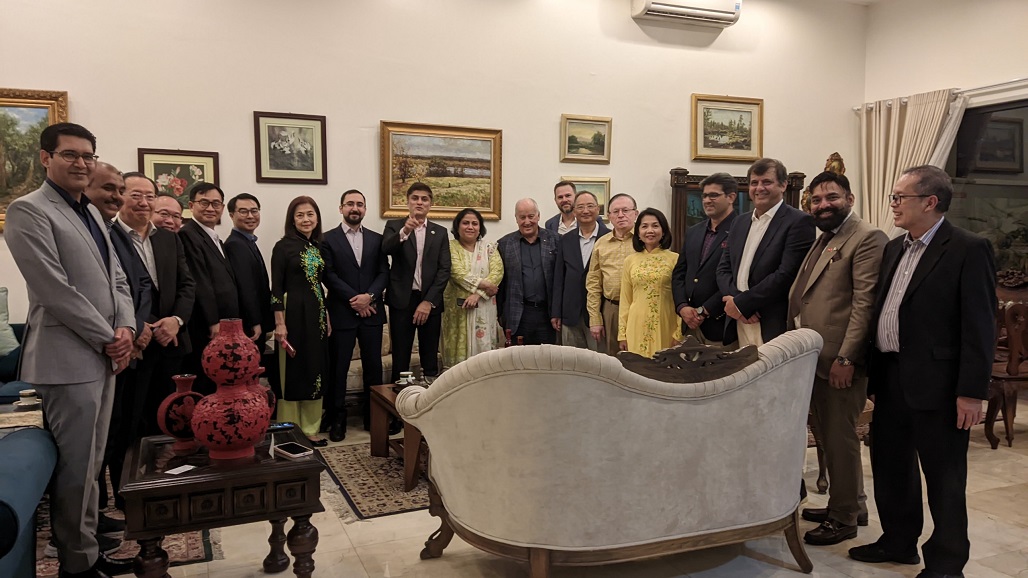
MAY 22, 2023
Meeting with Officers and Members of the Vietnam Chamber of Commerce and Industry
As the first activity for Day One Program of the visit, Mr. McMullin and his delegation went to the headquarters of Vietnam Chamber of Commerce and Industry (VCCI), where they were met by the officers and members of the Chamber led by Chairman and President Mr. Pham Tan Cong.
In his Welcome Remarks, Chairman Pham noted that given the currently difficult economic situation globally, it is important for business organizations such as CACCI and VCCI to explore possible areas of collaboration to help enterprises and their respective constituencies overcome various challenges over time.
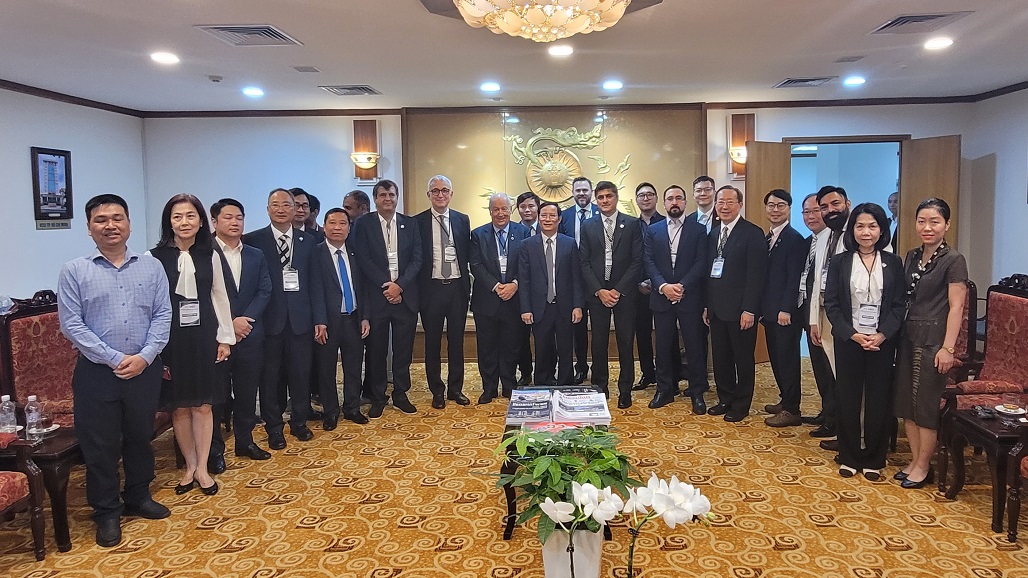
In response, Mr. McMullin thanked Chairman Pham for receiving the delegation and for the active role and strong support that VCCI has played in CACCI over the years, including previously hosting two Presidential visits (in 2011 and 2018) and two CACCI Conferences (1993 in Hanoi and 2000 in HCMC).
He also expressed his hopes that VCCI will remain actively involved in the Confederation as CACCI certainly needs Vietnam’s representation in the group, given the important role that the country’s economy and business sector play in the development of the Asia-Pacific region.
Mr. McMullin informed the VCCI Chairman that during his CACCI Presidency, he will work around the SET principle – Sustainability, Entrepreneurship, and Trade – as a basis for collaboration and cooperation among countries in the region to create an environment conducive to the growth of business and ensure stability and peaceful and productive relationship between countries, thereby making businesses merchants of peace.
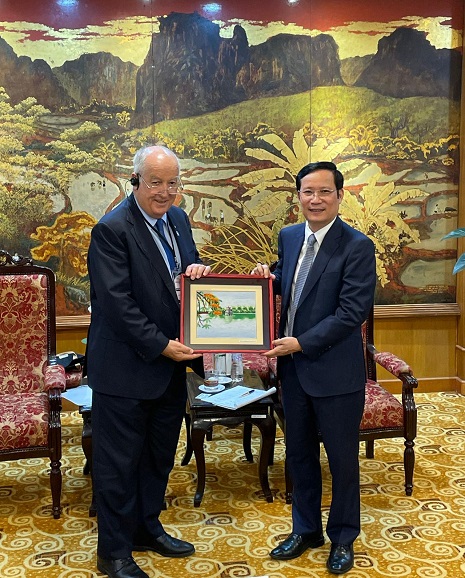
Chairman Pham said that since Vietnam adopted the market economy in 1990, CACCI has provided VCCI the much-needed support to reach out into the regional and international markets. He said that since then, the Vietnamese economy has been doing very well, averaging an annual economic growth of 8%, one of the highest in the world.
The country hopes to maintain this growth momentum, targeting an average growth rate of 6-7% in order for Vietnam to become a developed country by 2035. He pointed out that VCCI, with its 200,000 enterprise members and 200 business association affiliates, aims to take advantage of the opportunities that will open up in the years ahead, and hopes to secure the support of CACCI in achieving this objective. VCCI also intends to remain a key policy adviser to the government, he added.
Chairman Pham welcomed the proposal of Mr. McMullin to host another CACCI Conference in Vietnam in the near future. He pointed out that despite the current geopolitical and economic challenges and difficulties in the global environment, Vietnam still sees the need for incoming and outgoing investments, particularly in green economy, circular economy, sustainable development, renewable energy, electronics, textiles and garments, ICT, and tourism, among others. To help achieve this objective the VCCI intends to continue its high-level commitment to take an active role in CACCI.
Members of the CACCI delegation raised the following points during the course of the meeting discussions:
(a) Mr. Khurram Sayeed cited the potential for bilateral trade between Vietnam and Pakistan in textiles, IT, fruits and vegetables, and pharmaceutical products.
(b) Mr. Jemal Inaishvili mentioned the important role played by Georgia as a transit point for goods to Central Asia as well as to European countries, and offered his assistance to discuss Vietnam-Georgia bilateral relations with relevant government officials in Georgia as well as in organizing visits of business delegations between the two countries.
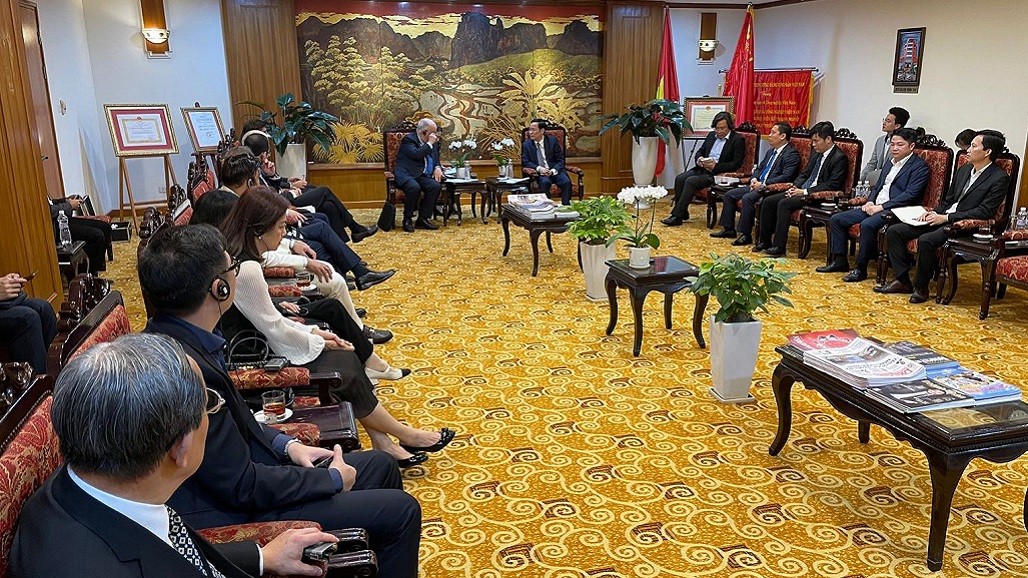
(c) Dr. Alireza Yavari from Iran cited the potential for Vietnam-Iran bilateral trade in products exempted from US sanction such as food, medicines, pharmaceutical products, medical equipment, agricultural products, garments and textiles, and agricultural machinery, among others.
(d) Mr. Ernest Yuen from Hong Kong said he will invite members from Kowloon Chamber of Commerce to visit Vietnam to explore first-hand business opportunities offered by the country.
(e) Mr. Atif Iqbal cited the business opportunities in Pakistan’s pharmaceutical sector which is composed of 600 manufacturing companies, adding that Vietnam and Pakistan can collaborate in manufacturing and selling quality medicines at affordable prices.
(f) Ms. Weena Lee from Hong Kong offered her assistance in business legal aspects between Hong Kong and Vietnam, taking into account the fact that international business consulting has shifted its focus on Vietnam and that legal services in Vietnam has taken a more sophisticated legal framework with the aim of protecting investors.
Chairman Pham informed the delegation that he will lead a business delegation to Taiwan during the fourth quarter of 2023 to promote Vietnamese investments between the two countries.
At the end of the meeting, President McMullin and Chairman Pham exchanged tokens of appreciation for the opportunity to share information and views on business opportunities between Vietnam and CACCI member countries.
Meeting with the Ministry of Industry and Trade
Following the meeting with VCCI, the CACCI delegation proceeded to the Ministry of Industry and Trade (MOIT) where they were welcomed by key Ministry officers led by Mr. Vu Ba Phu, Director General of the Viet Nam Trade Promotion Agency.
In his Welcome Remarks, Mr. Vu informed the delegation that the MOIT is the government ministry in Vietnam responsible for the advancement, promotion, governance, regulation, management and growth of industry and trade. He said that:
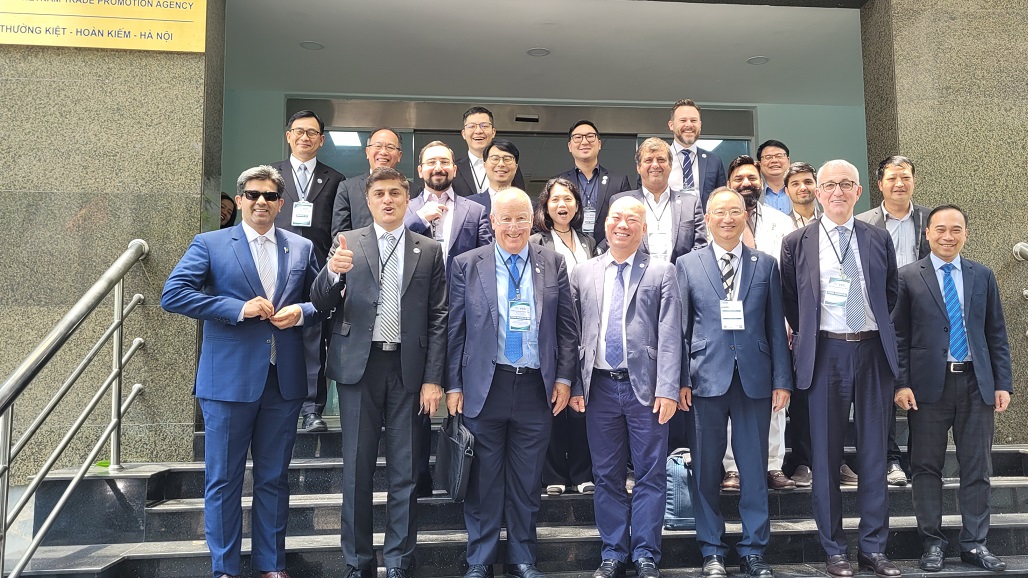
(a) On the one hand, the MOIT provides the policy mechanism for the growth and development of Vietnam’s trade and investment. On the other hand, the MOIT provides public services to enterprises, and trade and industrial organizations.
(b) The MOIT has set up a One Centre for International Trade and Promotion which has working relations with more than 100 organizations, attends to bilateral relations with other countries (cultural, economic, etc.), and deals with importers and exporters through its 150 local offices and three overseas offices.
In response, CACCI President Mr. Peter McMullin:
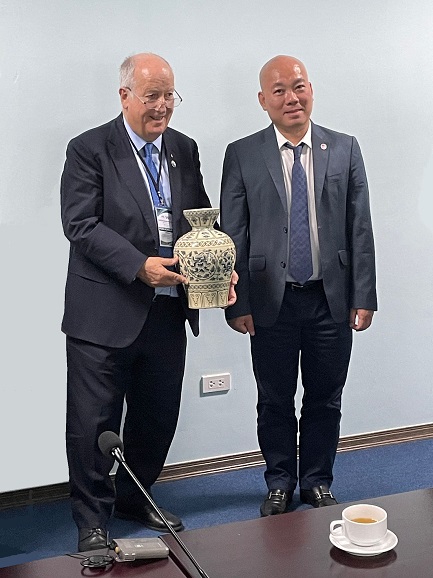
(a) Thanked the Ministry for receiving the CACCI delegation and for making the necessary arrangements for the visit and its warm hospitality, as well as the government of Vietnam for its support of CACCI and its activities through the strong and active cooperation of VCCI.
(b) Introduced CACCI by mentioning that: it was established in 1966 to provide a platform for networking and cooperation among businessmen in the region; CACCI’s membership currently includes 28 national chambers of commerce and industry from 26 independent economies – including VCCI; CACCI has working relationships with other regional and international organizations such as the International Chamber of Commerce, the Eurochambres, the ASEAN Business Advisory Council, the APEC Business Advisory Council, the Pacific Alliance, the Indian Ocean Regional Association, the B20, the World Trade Organization, the SAARC CCI, and the Asian Development Bank, among others; CACCI has consultative status with the United Nations and a member of the Conference of Non-Government Organizations (CoNGO) under the UN umbrella.
(c) Mentioned that Vietnam – through the VCCI – has always played an active role in the Confederation: Since it joined as a CACCI Primary Member in 1990, VCCI has hosted two annual gatherings – the first one in 1993 in Hanoi, and the second one in 2000 in HCMC, and VCCI has also hosted two CACCI Presidential visits before – in 2011 and in 2018.
(d) Expressed his hopes that Vietnam – through VCCI – will remain actively involved in the Confederation, adding that CACCI certainly needs Vietnam’s representation in the group, given the important role that the country’s economy and business sector play in the development of the Asia-Pacific region.
(e) Pointed out that, considering the geographical scope of its membership, CACCI provides a good platform for the Vietnamese business community to reach out into the regional market, and for the Vietnamese government to promote its trade and investment policies for the region.
(f) Extended an invitation for Vietnamese government officials and businessmen to attend the 37th CACCI Conference to be held on 30-31 October 2023 in Cambodia to be hosted by Cambodia Chamber of Commerce.
(g) Expressed his hopes that Vietnam – through the initiative of VCCI and the support of the Vietnamese government – can host another CACCI Conference in the near future, given that the last Conference was held 23 years ago in 2000 in HCMC.
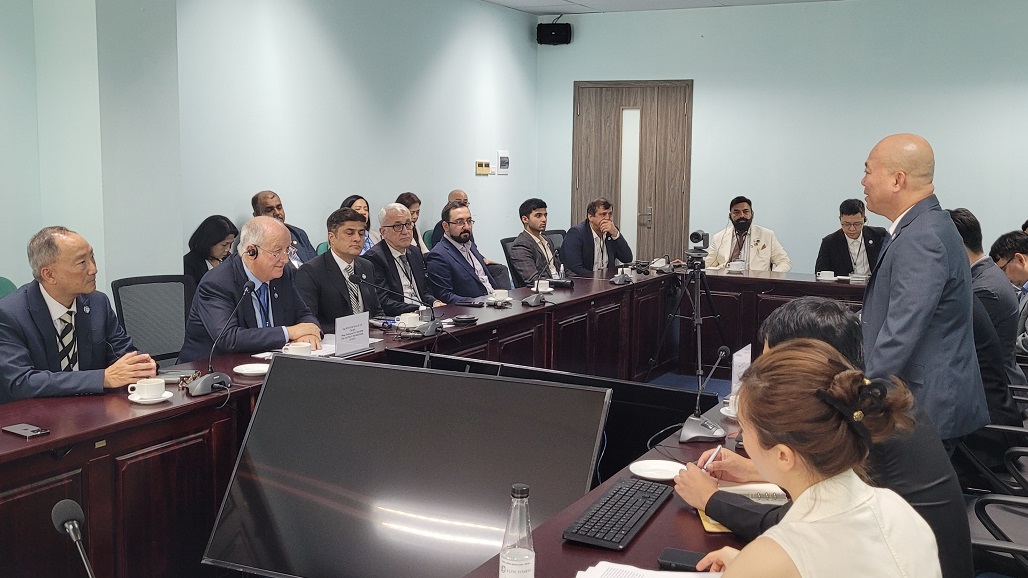
Following Mr. McMullin’s response, Director-General Vu provided the delegation the following salient macroeconomic information about Vietnam to provide CACCI members some basis for deciding how foreign investors can cooperate with the country:
(a) Vietnam is a typical example of a WTO member in terms of how it benefited from its membership in the organization. Among others, since its admission into the WTO, Vietnam’s GDP grew four times; it is one of the 22 countries with the biggest trade revenue in the world in terms of both volume and value;
(b) FDIs have played a major role in the country’s growth; FDIs account for 70-75% of the country’s total revenue, with Japanese investment expected to continue growing in the next five years;
(c) Vietnam is considered the workshop of the world beside China, especially in electronics and textiles and apparels;
(d) The country enjoys the advantage of having 18 free trade agreements with many countries (CPTPP, IFAP), and has recently concluded FTA negotiations with Israel and the UAE.
(e) Vietnam has a young population, with 65% of its people under 45 years of age;
(f) The country’s infrastructure has continued to be upgraded over the past 10 years;
(g) Vietnam has great connectivity with neighboring countries in the north, and demonstrates great dynamism with neighboring countries in the south; The Mekong Delta River has improved and enhanced connectivity with neighboring countries both in the north and the south;
(h) Agricultural and fishery products are major exports (including forestry, aquaculture, rice, coffee, cashew nuts), and Vietnam is one of the top five exporters in the world in wooden furniture;
(i) The country targets FDIs in processing and in-depth processing products (e.g. vegetables and fruits)
(j) The country’s industrial sector is focused on producing for exports and on developing the foundation industries (e.g., chemicals, mechanical equipment)
(k) Vietnam is among the strongest in the world in textiles (weaving and dyeing using new technology), leatherware, and construction materials;
(l) E-commerce and digital economy is expected to post a 25-27% growth rate annually over the next five years;
(m) Vietnam is ranked top three in Asia in terms of the number of companies using digital application, and is expected to become the hub for AI and digital transformation of the APEC region;
(n) It is considered one of the top counties in terms of Internet and smartphone users
(o) With a population of 100 million, Vietnam has the potential to have a strong retail and service sectors;
(p) Vietnam encourages 100% FDI instead of through joint ventures or through M&A via securities markets;
(q) Vietnam’s Investment and Corporate Law covers both local and foreign companies (and does not discriminate between the two)
At the end of the meeting, President McMullin and Director-General Vu exchanged tokens of appreciation for the opportunity to share information and views on trade and investment opportunities between Vietnam and CACCI member countries.
Lunch Hosted by CACCI President
After the meeting with MOIT, Mr. McMullin hosted lunch for the delegation at the Ngon Garden Restaurant, where they enjoyed a great selection of Vietnamese cuisine.
Meeting with the Ministry of Agriculture and Rural Development
Following lunch, the delegation made its way to the Ministry of Agriculture and Rural Development (MARD) – the government ministry responsible for rural development and the governance, promotion and nurturing of agriculture and the agriculture industry in Vietnam – where they were received by key Ministry officials headed by Deputy Minister Tran Thanh Nam.
Mr. McMullin opened the meeting by thanking the Ministry for receiving members of his delegation and for the strong support of the Vietnamese government – through VCCI – for CACCI and its activities. He also took the opportunity to introduce CACCI and the role it plays in promoting business in the region, the important role the VCCI has played in the Confederation since joining as a Primary Member in 1990, and to convey his invitation for Vietnamese officials and businessmen to participate in the 2023 CACCI Conference to be hosted by the Cambodia Chamber of Commerce in Phnom Penh in end-October. He also expressed his hopes that Vietnam can once again host a CACCI Conference in the near future.
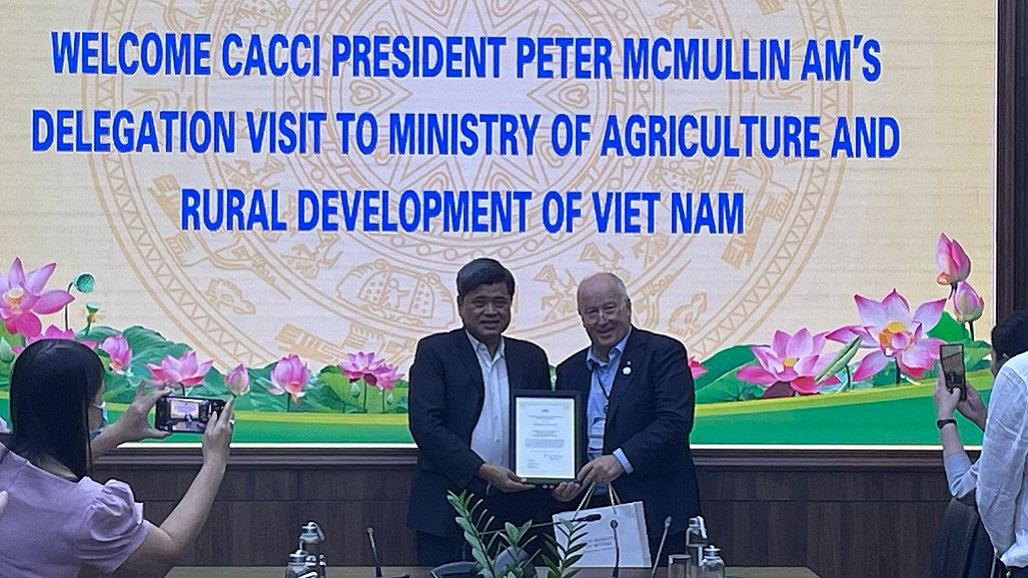
After welcoming the CACCI delegation and thanking them for visiting Vietnam and the Ministry, Deputy Minister Tran shared the following information:
(a) After the pandemic, ensuring food security has become one of the top priorities of the country (which has 28 million hectares of land available for agricultural production), thereby making agriculture as the pillar of the economy and playing an important role in food security.
(b) Due to the Covid pandemic, there has been loss in agricultural production and a change in the consumption pattern;
(c) Among the strategic agricultural products of Vietnam are rice, coffee, cashew nuts, vegetables, lumber, and wooden furniture products;
(d) Livestock, horticulture and crop production are also expected to deal with climate change impact;
(e) There are currently 15,000 enterprises engaged in the agricultural sector.
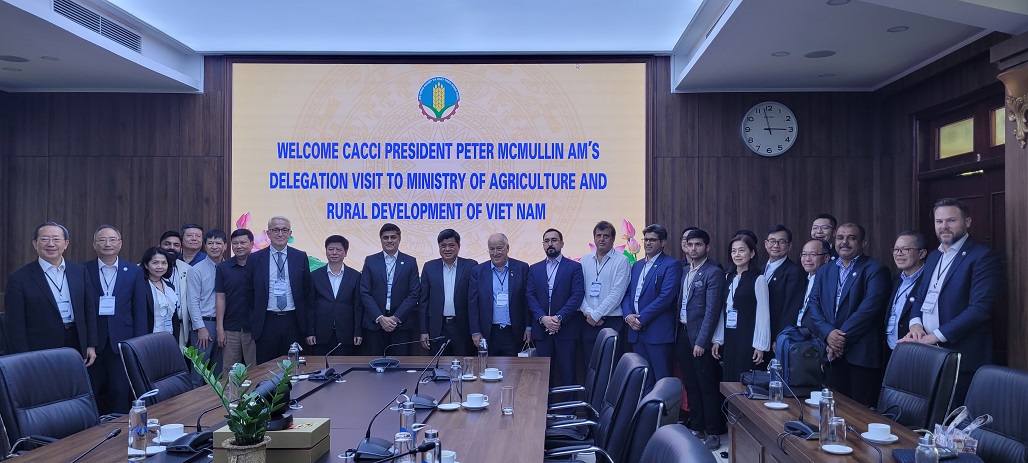
The Deputy Minister expressed interest to send delegation to the CACCI Conference in Cambodia in end-October. He expressed hope that through CACCI, investment in the agricultural sector in Vietnam would increase, and therefore suggested that the CACCI Conference in Cambodia should also address the issue of food security and that efforts to develop a global supply chain in agriculture can be established to ensure food security worldwide.
During the discussion that followed, a number of issues and suggestions were raised by the CACCI delegation, including the following:
(a) Pakistan and Vietnam can cooperate with each other in addressing food security issues. With 63% of its population living in the rural area, Pakistan can import agricultural products to meet the country’s food needs, such as edible oil, cotton, wheat, and sugar. Pakistan can also export fruit and vegetables, and meat. There is therefore potential for small bilateral trade between the two countries in agricultural products.
(b) With Iran importing huge quantity of rice, the country can source some of its rice imports from Vietnam, which is known for the good quality of its rice production. On the other hand, Iran can export to Vietnam products exempted from the US sanction including agricultural products, and agricultural machinery and equipment.
(c) Georgian ports can serve as a transport point for Vietnamese agricultural products to Central Asian countries and to Europe.
(d) 25% of Hong Kong’s rice and coffee imports come from Vietnam. Kowloon Chamber of Commerce can help to bring to Vietnam more potential buyers from Hong Kong;
Deputy Minister Tran further informed the delegation that:
(a) Vietnam will continue to pay attention to the development of sustainable agricultural growth;
(b) The country needs agricultural equipment;
(c) Vietnam will increasingly focus on specialized rice production (high quality and low-carbon);
(d) The Ministry wants to reduce the number of intermediaries in the trading of food products, thereby reducing cost. There is a need to find business partners who can act as bridge between CACCI member countries;
(e) He reiterated his suggestion to have the CACI Conference in Cambodia focus on agricultural issues.
At the end of the discussion, President McMullin and Deputy Minister Tran exchanged tokens of appreciation for the opportunity to share information and views on business opportunities in the agricultural sector between Vietnam and CACCI member countries.
Meeting with Ministry of Planning and Investment
After the meeting with the Ministry of Agriculture and Rural Development, the CACCI delegation moved to the Ministry of Planning and Investment (MPI) for a meeting with the Ministry’s key officials headed by Deputy Minister Tran Quoc Phuong.
Deputy Minister Tran briefly welcomed the delegation and wished them a highly successful and productive visit to Vietnam.
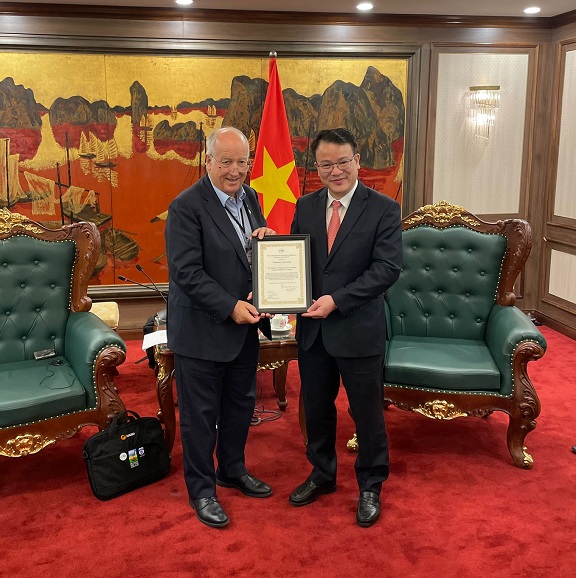
Mr. McMullin thanked the Deputy Minister for welcoming the delegation. He proceeded to introduce CACCI and its activities and highlighted the important role of Vietnam – through the active involvement of VCCI – in supporting the efforts of CACCI to promote the interest of businessmen in the region and enhance business cooperation. He also cited the SET principle that CACCI under his presidency will pursue to further strengthen the importance of the business sector in achieving regional growth and attaining peaceful co-existence among countries in the through pursuing sustainability, entrepreneurship, and trade.
The CACCI delegation thereafter highlighted the following issues from the perspective of their respective countries:
(a) Mr. Khurram pointed out the potential for bilateral investment between Pakistan and Vietnam in agricultural production (with Pakistan as a source of fruits, vegetables, and seafoods), as well as in construction, pharmaceuticals, e-commerce, renewable energy, cosmetics and jewelry. He also pointed out the need to address the visa issuance policies through diplomatic dialogue to allow Pakistani and Vietnamese businessmen to travel easily between the two countries.
(b) Mr. Ernest Yuen from Hong Kong said that Vietnam is not new to the Hong Kong people, especially now that the cost of labor in China is getting higher, many Hong Kong businessmen are planning to move to Vietnam. He added that he will take an active role in inviting Hong Kong businessmen and investors to visit Vietnam to know more about the current economic and investment environment in the country.
(c) Mr. Jemal Inaishvili from Georgia stressed the important role played by Georgia as a transit hub for the Central Asian region. He noted that Vietnam has progressed very well and has become more attractive to foreign investors. He mentioned that Georgia will be hosting the Annual Meeting of the Asian Development Bank (ADB) in 2024, adding that Georgia has benefited from the development financing program of the ADB.
(d) Dr Alireza Yavari from Iran said that the 2009 bilateral investment treaty between Iran and Vietnam entered into force in 2011; however, this has not been fully utilized probably because of the US sanctions. The two countries can explore the possibility of promoting investments in sectors that are exempted from US sanctions such as agriculture, telecommunications and food production.
There are also opportunities for cooperation in engineering projects and construction projects. Dr. Yavari noted that the Vietnamese economy is booming and proposed the idea of conducting a webinar on investment opportunities in Vietnam with the aim of bringing in more investors.
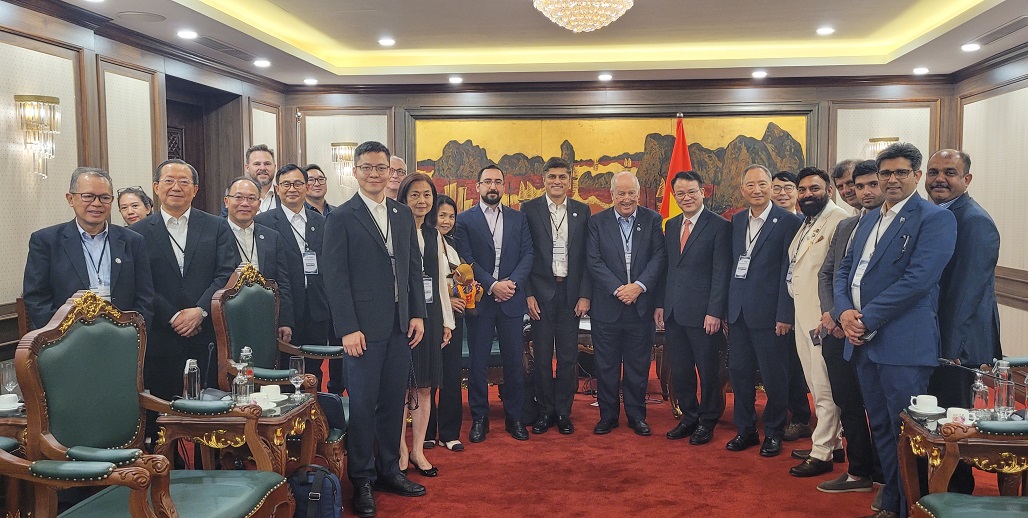
In response to various comments from the CACCI delegation, Deputy Minister Tran said that:
(a) The information shared by the delegation is very useful for Vietnam in its efforts to promote cooperation with other countries in the region.
(b) He appreciates the support that CACCI has been providing VCCI, which in turn has been contributing to the efforts of the Vietnamese government to strengthen economic relations with other countries.
( c) He was grateful for the invitation to attend the CACCI Conference to be held in Cambodia in end-October, and that he would convey the invitation to the Minister.
(d) He supports the proposal of CACCI President McMullin to organize a CACCI Conference in Vietnam in the near future, adding that he considers it an important event since it will provide Vietnam the platform to share information with other CACCI member countries on trade and investment opportunities in the country and promote collaboration among businessmen in the region.
(e) Vietnam has a high-level of openness for foreign investment and that, while trade has reduced in recent years due to lower global demand brought about by the pandemic (resulting in spending cuts, security issues, etc.), Vietnam is determined to expand collaboration with other economies to meet future difficulties.
(f) Vietnam hopes to increase collaboration efforts with foreign enterprise for investment in various sectors such as digital transformation, green economy, digital economy, and renewable energy, pointing out that the country is committed to achieving net-zero carbon emissions and the mobilization of green resources into the country (e.g., investment projects related to green hydrogen.
(g) Vietnam is encouraging investment in environmentally-friendly projects using advanced technology. It is also actively promoting the use of digital technology among enterprises in various industries.
(h) He encouraged the sharing of information on potentials for promoting greater cooperation in various sectors and products such as agriculture, food, textiles, wood furniture, electric vehicles, and high-tech modern products, among others.
(i) He expressed hope that VCCI will work more closely with CACCI in promoting cooperation with other CACCI member countries, adding that the Minister of Planning and Investment would provide support through the implementation of appropriate investment policies and participation in future CACCI activities.
At the end of the productive dialogue, President McMullin and Deputy Minister Tran exchanged tokens of appreciation for giving the two sides the opportunity to share relevant information and perspectives on trade and investment opportunities between Vietnam and CACCI member countries.
Dinner Hosted by CACCI President
On the evening of Day Two of the Vietnam visit, CACCI President hosted dinner for members of the delegation at the Cơm Việt Restaurant.
MAY 23, 2023
Visit to the Kinh Bac City (KBC) Group
The second day began with a morning visit to the headquarters of Kinh BAC City (KBC) Group located in Ban Ninh Province which is some 1.5-hour drive from Hanoi.
Upon arrival at the KBC complex, the visitors were first given a tour of the Que Vo Industrial Park, one of the 36 industrial parks established and managed by the KBC Group around Vietnam. Established in December 2002, Que Vo Industrial Park is the largest and most important industrial park of Bac Ninh Province, encompassing a total area of 611 hectares and has attracted more than 100 domestic and foreign investors.
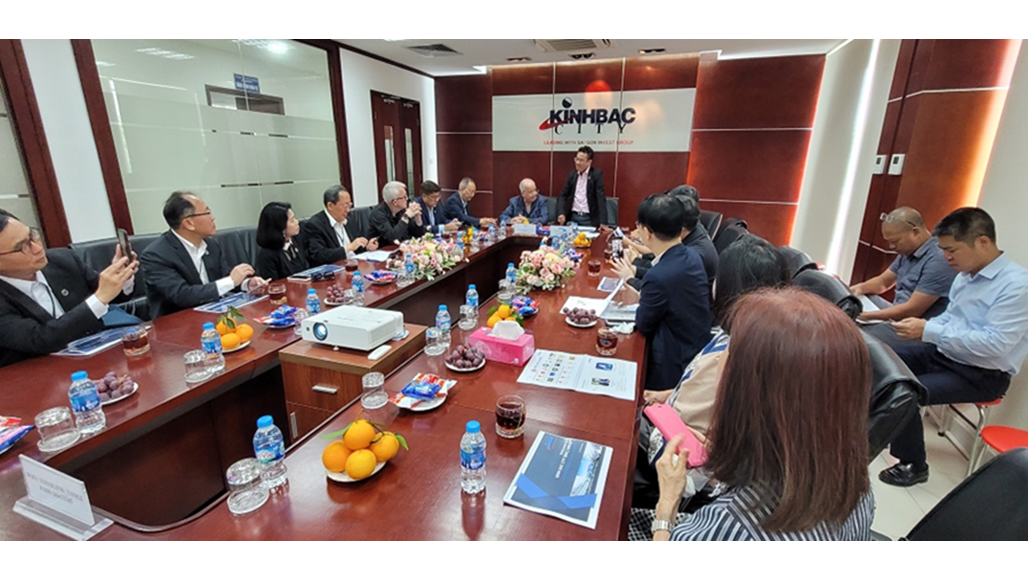
Following the tour, the delegation proceeded to the KBC Group headquarters where they were welcomed by Chairman Mr. Dang Thanh Tam. After welcoming the visitors, Chairman Dang briefed them on the KBC Group and its activities, highlighting the following:
(a) KBC is considered the leading enterprise in Vietnam in terms of investment, development, construction and business of industrial park and urban infrastructure, with 6,387 ha. of industrial land and 1,263 ha. of residential land. With over 21 years of experience, it has attracted 1,000 FDI projects and US$ 17Billion FDI capital, generated 300,000 jobs, and currently hosts tenants from 30 countries and territories representing 60% of the world-famous brands and main suppliers.
(b) The Industrial Parks account for 20% – 30% of foreign investments attracted to Vietnam annually, have accounted for 5% of new additional jobs created every year in Vietnam; and generated US$19 Billion in exports in 2022
(c) KBC’s core business includes 24 large-scale and modern projects of industrial and residential area in Vietnam, widely distributed in the north, the central and the south of Vietnam.
(d) The KBC Group can assist foreign investors in various aspects, including application for legal entity establishment, strong connection with government agencies, land planning design and construction work, application for land use rights certificate, tax code and company seal, and human resources and recruitment.
( e) The KBC Group plans to establish an Innovation Centre and/or a Research Development Centre within the complex in the near future.
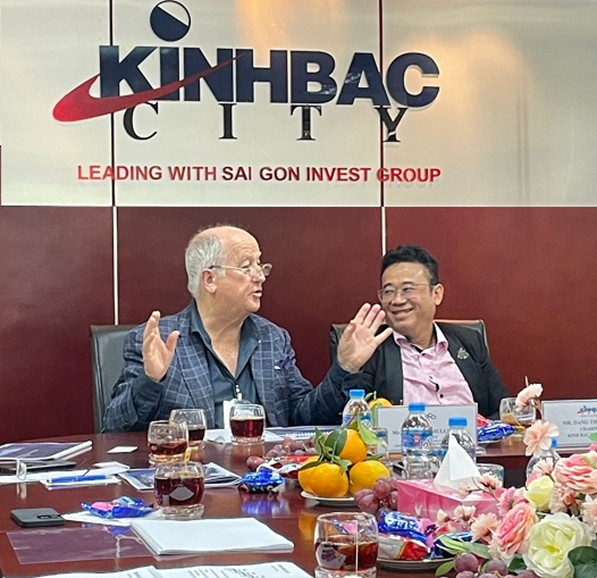
During the Q&A Session that followed the Chairman’s briefing, the following points were raised by the CACCI delegation:
(a) CACCI President Mr. Peter McMullin AM underscored the importance of the business community in economic growth and sustainable development of the country. He mentioned that his family was involved in the business of industrial park development in Australia. He extended his invitation to Chairman Dang to attend the 37th CACCI Conference in Cambodia on October 30-31, and expressed this hopes that Vietnam would once again host a CACCI Conference in the near future and use the occasion to serve as a platform for attracting foreign investors into the country.
(b) Mr. Ernest Yuen assured Chairman Dang that he would personally invite Hong Kong investors to visit Vietnam and the KBC Group.
(c) Mr. Khurram Sayed congratulated the Chairman for the important activities of the KBC Group and for the various awards and citations it has received for its various outstanding achievements in attracting foreign investors into the country.
(d) Mr. Jemal Inaishvili congratulated the Chairman for successfully attracting big multinational companies into the industrial parks, and said Georgia could learn from the experience of Vietnam in establishing and operating industrial parks.
(e) Mr. Michael Lee from Korea cited the importance of improving human resources in any organization and praised KBC for its program in providing education and training to its employees. Training of employees in Vietnam should not be a problem since the country has one of the highest literacy rates in the region.
At the conclusion of the meeting, President McMullin and Chairman Dang exchanged tokens of appreciation for the opportunity to obtain important information on the activities of the KBC Group and how it can help foreign investors from other countries to set up shop in Vietnam.
Lunch hosted by KBC Group Chairman
Chairman Dang, accompanied by some of his key officers, thereafter graciously hosted lunch for the delegation at the San San Restaurant located just outside the Industrial Park.
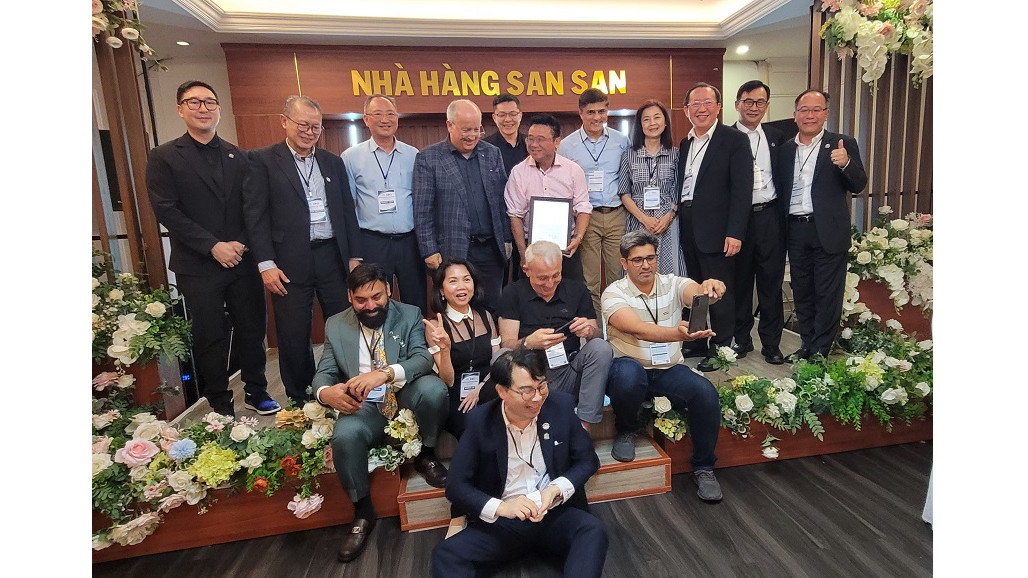
Meeting at the Australian Embassy in Vietnam
After lunch, the delegation moved to the Australian Embassy in Vietnam for a scheduled meeting with Mr. Mark Tattersall, Australia’s Deputy Head of Mission in Vietnam and his colleagues.
Following Mr. McMullin’s brief introduction of CACCI and its activities, Mr. Tattersall shared the following relevant information to the visiting delegation:
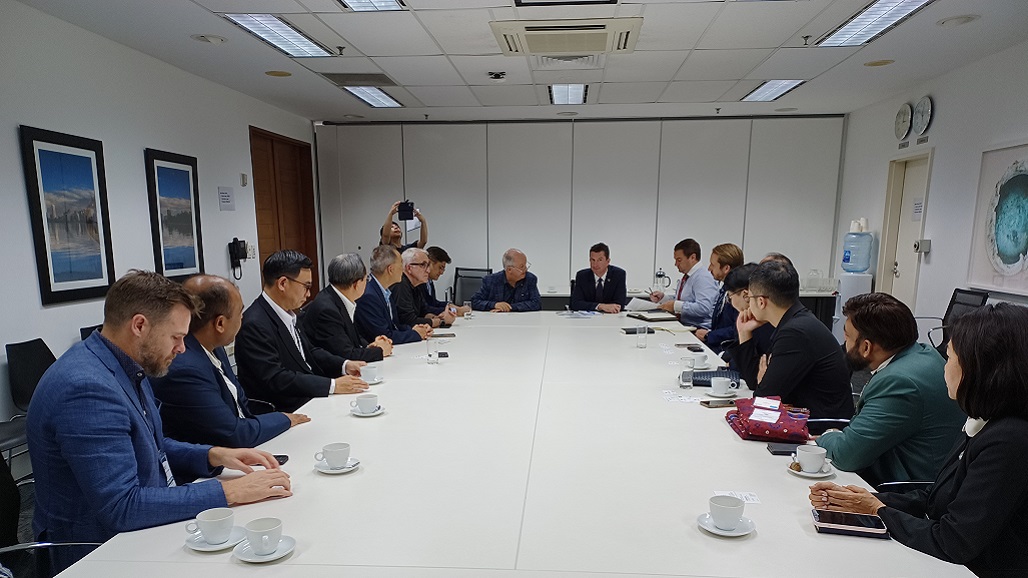
(a) Australia has a strong economic presence in Hanoi. Some 300,000 Vietnamese have studied in Australia over the past years, of which around 80,000 Vietnamese students have come back to Vietnam. There are 3,000 Vietnamese currently studying in Australia.
(b) The year 2023 marks the 50th anniversary of diplomatic relations between Australia and Vietnam, with Australia being one of the first to recognize Vietnam after the Paris Accord.
(c) Australia and Vietnam recently signed an Enhanced Engagement Agreement aimed at further strengthening their bilateral relations.
(d) Australian exports of agricultural products to Vietnam has grown 150% over the past two years.
(e) Australia is considered a pioneering investor in Vietnam. For instance, ANZ Bank is the first Australian bank that set up operations in the country.
(f) As Vietnam moves up the value chain, Australia’s investment has shifted to the services, education, energy and energy transition
(g) Vietnam offers vast business opportunities given its consistently strong economic growth of 7-7.5% economic growth since the country opened up in 1990.
(h) However, there remain some structural barriers. For instance, many enterprises are still state-owned, thereby posing problems in pushing for needed reforms.
(i) Vietnam offers vast potentials for investments in offshore wind and solar energy in which it has shown great track record for growth.
(j) Vietnam offers the advantage of having an integrated investment policy, promoting double dividend of both quantity and quality investments.
(k) Vietnam has good investment potential for Australia in sectors such as food and agricultural products, wine, energy, health care, skilling and higher education, technical and vocational education as well as in activities such as the modernization of the Vietnamese government, establishment of smart cities (transportation and power), and possibly impact investing.
(l) Having a good local partner will work to the advantage of foreign investors, who should therefore consider going into joint ventures. It is also important for investors to conduct due diligence.
(m) There are still some sectors where investments may pose some issues, such as investments in security-related industries where regulations are unclear or not fully supported. For equity investment, Vietnam is still considered a frontier market, given its underdeveloped and unclear regulatory environment. There are also some industries with equity limitation for foreign ownership.
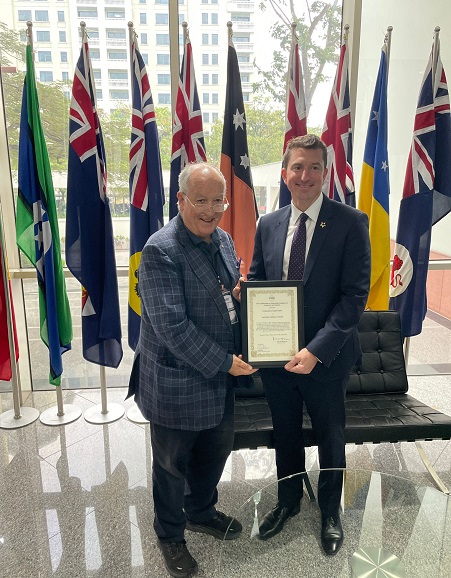
At the conclusion of the meeting, President McMullin and Mr. Tattersall exchanged tokens of appreciation for the opportunity of information sharing on the extent of Australian presence and activities in Vietnam to help improve bilateral relations between the two countries.
Visit to the CTBC Bank Representative Office in Hanoi
From the Australian Embassy, the delegation proceeded to the Representative Office of CTBC Bank in Hanoi, whose office is located just a block away from the Australian Embassy.
Mr. Elton Cheng, CTBC Bank Vice President and Chief Representative in Hanoi, arranged for a brief video presentation on the history and activities of CTBC Financial Holdings and of the CTBC Bank Representative Office in Vietnam, followed by a Q&A session with the members of the delegation and later by a group photo.
